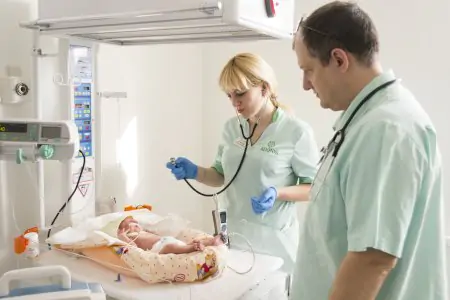
Pour les partenaires
Sécurité Patient
Sécurité Patient



Voir toutes les photos
Ukraine
Kyiv 
FIV+ICSI avec le coût des médicaments
ADONIS Fertility Center
Ukraine Kyiv
89% des clients recommandent cette clinique
note de Excellent basée sur 28 avis de patients Lire les avis Fertility specialist
Olga Tarasenko
Certified member of the European Society of Human Reproduction and Embryology (ESHRE).
À propos
Dr. Olga Tarasenko is a Category A, MD-certified Obstetrician-Gynecologist and Fertility Specialist. She has 12 years of clinical experience. She graduated from Bohomolets National Medical University. She completed her internship at Shupyk National Medical Academy. She also specialized in Ultrasound Diagnostics at the Ukrainian Military Medical Academy.
Dr. Tarasenko is accredited by the European Society of Human Reproduction and Embryology (ESHRE). She has attended over 30 international conferences, seminars, and advanced training courses in ART, reproductive endocrinology, and ultrasound diagnostics. She has managed hundreds of infertility cases. She is known for her skills in modern reproductive technologies and evidence-based clinical care.
Détails du programme
Spécialisé dans la fécondation in vitro (FIV), le spécialiste de la fertilité hautement qualifié du centre médical ADONIS FAMILY propose un diagnostic complet du couple, des options de don et des transferts d'aéroport. Évaluation de la clinique : 4.5.
En savoir plus sur les avantages du programme
Procédures Médicales
- Fécondation In Vitro (FIV)
- Comprehensive couple diagnosis before IVF
Hébergement
Two-bed ward
Transport
Transfer airport-hotel-clinic-airport
Informations complémentaires
Medical services
Cryopreservation and storage of sperm during 12 months
IVF+ICSI with the medicines cost
Controlled stimulation of Patient`s ovarii (induction of superovulation) (without the cost of medicines)
Medical supply of induction of superovulation Individual Protocol
Test on progesterone of blood at day of trigger injection
Consultation of anaesthesiologist
Intravenous anesthesia (up to 30 minutes)
Transvaginal punction of ovarii (without cost of intravenous anesthesia) (TVP)
Preparation of sperm for IVF program
Intracytoplasmic sperm injection (ICSI)
Cultivation of embryos in IVF program, including till blastocyst stage (by needs)
Embryos transfer (ET) in Patient`s uterus cavity in IVF program
Cost of embryological supply of TVP
Cost of embryological supply of ET
Blood test on Human chorionic gonadotropin (beta-hCG)
Ultrasound diagnostics of pregnancy in terms up to 11th weeks
Blood sampling
Non-medical services
Translation of Patients` documents for Medical Center (passports, marriage certificate)
Coordination Services of IVF Program
Free 2nd medical opinion
Assistance Bookimed 24/7
Coordinateur médical personnel
Organisation de voyage médical — réservation des tickets de vol et des chambres d'hôtel à des prix réduits pour les partenaires
Prise en charge du patient lors d'un voyage médical
Avis des patients
1 étoiles
0%
2 étoiles
0%
3 étoiles
0%
4 étoiles
0%
5 étoiles
100%
Le tarif global de ADONIS Fertility Center comprend
Médecin
personnel
Établissements
Support linguistique
Support
5 déc. 2023
Avis vérifié.
Toutes les informations ont été fournies avec compétence et précision. Je suis satisfait des conclusions du médecin.
Compétence du médecin
À propos du service bookimed
J'ai reçu une réponse rapide à toutes mes questions.
Show original
YUliya • Fécondation In Vitro (FIV) Ukraine
10 mars 2024
Avis vérifié.
Наталья • Fécondation In Vitro (FIV) Allemagne
9 févr. 2024
Avis vérifié.
Тамара • Fécondation In Vitro (FIV) Ukraine
2 nov. 2022
Avis vérifié.
Localisation
26К Dniprovska Naberezhna str, Kyiv, Ukraine, 02000
FAQ
Technologies de procréation assistée en FIV
Les technologies de procréation assistée (ART) comprennent :
- insémination intra-utérine avec sperme;
- ICSI (ICSI) - injection de spermatozoïdes dans la coquille de l'ovule ;
- IMSI (IMSI) - injection d'un spermatozoïde sélectionné (le plus sain) dans un ovule ;
- TESA (TESA) - aspiration (biopsie) de plusieurs sections des testicules ;
- TESE (TESE) - prélèvement de tissu testiculaire pour la recherche ultérieure de spermatozoïdes viables ;
- cryoconservation (congélation) d'ovules, de spermatozoïdes et d'embryons ;
- don d'ovules, de sperme et d'embryons;
- mère de substitution.
La FIV, comme d'autres méthodes de traitement de l'infertilité utilisant l'ART, est pratiquée par des médecins en ambulatoire.
Qu'est-ce qui est inclus dans le programme complet de fécondation in vitro dans les cliniques partenaires de Bookimed ?
Souvent, un programme de FIV comprend :
- consultation avec un obstétricien-gynécologue, embryologiste ;
- stimulation de l'ovulation;
- recevoir des œufs (ponction);
- fécondation d'œufs matures;
- culture d'embryons (généralement 5 jours) ;
- transfert d'embryons (blastocystes) dans l'utérus.
Avant et après la FIV, la patiente suit un traitement hormonal spécialement sélectionné.
À la fin de la deuxième semaine après le transfert des embryons, la femme subit un test de grossesse et, en cas de résultat positif, une échographie.
Dans la plupart des cas, les médecins combinent la FIV avec d’autres techniques de procréation médicalement assistée. Par exemple, le transfert de blastocyste (au 5ème jour du développement embryonnaire) augmente les chances de réussite de l'implantation et réduit le risque de grossesses multiples. Et le diagnostic génétique préimplantatoire des embryons permet d'éviter un certain nombre d'anomalies chromosomiques.


